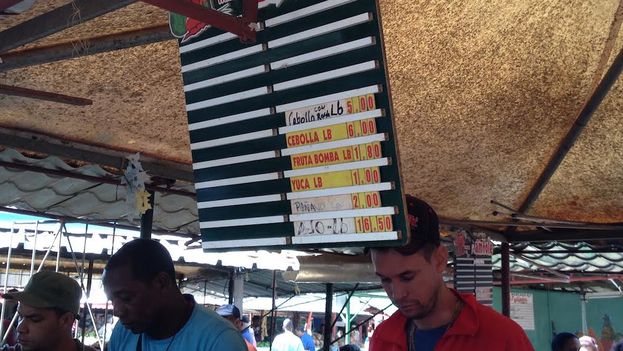
![]() 14ymedio, 25 January 2016 — What began as a novelty in mid-January has become common in the Cuban capital. The network of agricultural markets with controlled prices now extends to 66 markets and the authorities plan to extend the measure to the 105 people’s council markets in the city, as confirmed by the official press.
14ymedio, 25 January 2016 — What began as a novelty in mid-January has become common in the Cuban capital. The network of agricultural markets with controlled prices now extends to 66 markets and the authorities plan to extend the measure to the 105 people’s council markets in the city, as confirmed by the official press.
The second secretary of the Communist Party, Jose Ramon Machado Ventura, said after a meeting held on Saturday in Mayabeque, that fixing prices is being evaluated, “setting a maximum” on the price of numerous products, based on the cost of production and the total supply of the goods.
However, Machado Ventura acknowledged at the meeting that to finally solve the problem more and higher quality goods need to be produced, and he railed against the “illegal intermediaries” on whom the State is placing the blame for the sharp increase in prices since the middle of last year.
In Havana, the so-called State Agricultural Markets (MAE) were added to those covered by price controls; these markets had been under non-state forms of management but have now reverted to their former status. At these sites the government will maintain price controls on products such as bananas, taro, tomatoes, onions, potatoes, garlic, cabbage, squash, peppers, papaya, pineapple, okra, eggplant, chard and beans.
The implementation of the measure carries with it major restrictions on private transport that cater to the non-state markets, as well as and on street vendors who, with their wheeled carts, sell fruits and vegetables. These vendors have faced heavy police raids in recent weeks, leading them to abandon the streets of Havana where they had already become a part of the everyday landscape.
After the early enthusiasm over price controls in a limited number of markets such as the Youth Labor Army (EJT) located on Tulipan Street in the Nuevo Vedado neighborhood, customers are beginning to voice their complaints about the decline in quality of the products and the lack of stable supplies.
“Yesterday I came and bought cheap taro, but today I came and there is nothing but sweet potatoes,” complained a buyer at this Sunday’s busy market. This weekend the pallets displayed green tomatoes, squash and bananas. “But they are not ripe, you have to buy them green and wait for them to ripen in the house,” the customer protested.
Some neighbors looked thankfully on the lower prices. “I am retired and can not be paying 25 Cuban pesos for a pound of tomatoes,” says a buyer near the EJT market. “Many people are profiting from people’s needs,” added the retiree, who sees it as a good thing, because “they’ll see for themselves where the shoe pinches, and how are they going to steal now.”
The authorities have stated that only an efficient use of the land could cut prices on a permanent basis. In a recent interview with Eddy Soca Baldoquín, director general of the National Control Center of Land and Tractors, he stated that the amount of agricultural land in Cuba amounts to 15.4 million acres. State management is in charge of 30.5% of the land; cooperatives, 34.3%; and the rest is in the hands of small farmers.
Since Decree-Law No. 259 on the leasing of idle land in usufruct was approved in 2009, some 279,021 people have received land throughout the country and they currently remain in possession of about 3.5 million acres. But the measure has not had the expected impact on productivity and the prices of goods.
In a recent inspection in the province of Pinar del Rio chaired by Machado Ventura, 3,531 land leases were terminated: at least 1,126 for breach of contract; 766 for the abandonment of the land for more than six months; 703 for not using the land for the purpose for which it was granted; while the rest of the cancellations were due to deaths or voluntary abdications.
